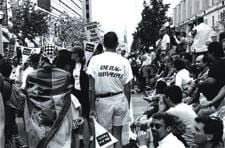York University professor Nancy Nicol’s films are a testament to the courageous perseverance of the gay and lesbian movement in Canada. The Queer Nineties begins with the failure of Bill 167 in Ontario and ends with the winning of same-sex relationship recognition and adoption rights in jurisdictions across Canada. It’s the latest installment in her series of documentaries on the history of lesbian and gay rights organizing in Canada (soon to be released as a box set, From Criminality to Equality, through Nightattheindies.com).
A longtime filmmaker with a keen interest in social justice, Nicol began the series 10 years ago in 1999. “I’d done a lot of work on social justice, human rights, labour, economic justice,” she says, “so at that point in my life I felt, ‘Hey, I’m a lesbian, maybe I should do some work on lesbian and gay rights.’”
Prompted in part by the then-approaching 25th anniversary of the Coalition for Lesbian and Gay Rights in Ontario, Nicol made Stand Together (2002), which focuses on the history of the movement in Ontario from 1967 to 1987. The next film, Politics of the Heart/La Politique du Coeur (2005) looks at the struggles of gay and lesbian families in Quebec (the first province in Canada to prohibit discrimination on the basis of sexual orientation in 1977) to achieve relationship recognition and parental rights. The End of Second Class (2006) follows the debate on same-sex marriage up to the passage of equal marriage legislation in 2005.
“This is a history that people don’t know a lot about,” Nicol says. “They tend to think that the rights and freedoms that we enjoy today just happened. But in fact there is a long history of activism — grassroots mobilizing, community building, human rights and civil rights campaigns and, beginning with the passage of the equality provisions of the Charter in 1985, more and more legal challenges.”
The Queer Nineties is a moving record of this tireless work of mobilization. It begins with the unravelling of efforts to pass Bill 167, which would have given same-sex relationships recognition in law. “There was huge anger in the community,” says Nicol. “People were very upset. And everyone was saying, we lost the battle but we will win the war. This struggle is not over. The theme of Pride Day that year was ‘The best is yet to come.’”
Indeed, the rest of the documentary covers other hard-fought battles, many of which were won by the end of the decade: battles for pension and survivor benefits, against the Surrey School Board’s banning of children’s books depicting same-sex parents, challenges made by the gay Asian community in Toronto to homophobia in the media. It is a story that Nicol tells through archival footage, newspaper articles, and through the voices of those who, as Nicol says, “are the authors of that history.”
Nicol hopes that the films will have a permanent place in the story of Canadian history and that the series (which includes a study guide written by Nicol) will find its way into public libraries, universities and high schools across Canada. The history of the gay and lesbian rights movement is an incredibly rich one, she says.
“It’s one of the most transformative movements of the past two generations. There’s still a ways to go,” Nicol adds, noting “there are big campaigns around human rights recognition and protection on the basis of gender identity and there’s a lot of work around transphobia.
“There’s still a lot of work to be done around homophobia, particularly in schools,” she continues. “As we’ve become more visible as lesbian and gay parents as well, I think kids of lesbian and gay parents are confronted with barriers.”
Nicol is beginning work on a piece about the legacy of the British criminal code’s sanction against homosexuality in its former colonies. But the ultimate message of her Canadian series From Criminality to Equality is that of the possibility of change. As Nicol says, “To celebration, that’s the next step, eh?”

 Why you can trust Xtra
Why you can trust Xtra


